Salisbury Novichok Poisoning: Two Russian Nationals Named As Suspects
Two Russian nationals have been named as suspects in the attempted murder of former Russian spy Sergei Skripal and his daughter Yulia.
They are thought to have been using the names as aliases and are about 40.
Mr Skripal, 66, and his daughter Yulia, 33, were poisoned with the nerve agent Novichok in March.
The CPS is not applying to Russia for the extradition of the two men, as Russia does not have extradition agreements with the UK. A European Arrest Warrant has been obtained in case they travel to the EU, however.
In response, the Russian foreign ministry has said the names and photographs of the men "do not mean anything to Moscow".
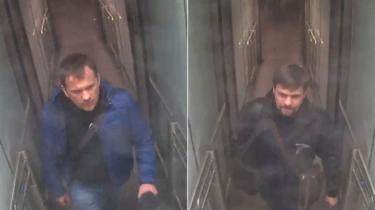 Police released CCTV showing the two men at Gatwick Airport
Police released CCTV showing the two men at Gatwick AirportMs Sturgess died in hospital on 9 July. Mr Rowley was discharged from hospital on 20 July.
Sue Hemming, CPS director of legal services, said there was enough evidence "to provide a realistic prospect of conviction" and that it was "clearly in the public interest to charge Alexander Petrov and Ruslan Boshirov".
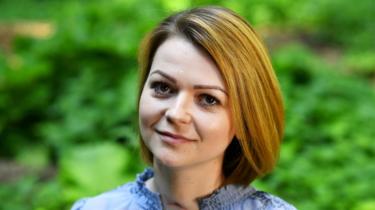 Yulia Skripal pictured in May after her release from hospital
Yulia Skripal pictured in May after her release from hospitalDet Sgt Nick Bailey also fell ill after responding to the incident in Salisbury.
Scotland Yard's Assistant Commissioner Neil Basu, the head of UK counter-terrorism policing, said on Wednesday that Det Sgt Bailey "continues to make good progress but remains off work".

What happens now?
Analysis by BBC News diplomatic correspondent Jonathan MarcusThe decision to name two Russian individuals as suspects in the Skripal case is a significant development - raising the level of evidence on which the British government's charges are based and potentially giving added weight to calls for additional international sanctions against Moscow.
The US, along with a swathe of Britain's allies, expelled a significant number of Russian diplomats (many thought to be intelligence agents) in the wake of the initial evidence that a Russian military grade nerve agent had been used in the Salisbury attack.
Since then, the US administration has brought in some additional measures mandated by Congress - and more are likely to be on the way - even though President Trump himself has not shown great enthusiasm for further pressure on Russia.
Britain will be hoping that other countries may now show more enthusiasm for stepped-up sanctions.

From there, they travelled to Salisbury on 4 March where Mr Skripal's front door was contaminated with Novichok.
Officers believe a perfume bottle was used to spray the door.
There is no risk to other guests who were staying at the hotel at the time, police said, but they want to hear from anyone who was a guest there from 4 March to 4 May.
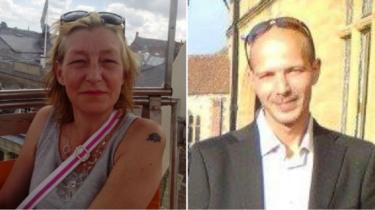 Dawn Sturgess and Charlie Rowley were also poisoned by Novichok
Dawn Sturgess and Charlie Rowley were also poisoned by NovichokMr Rowley has told police he found the box containing the small bottle and an applicator in a charity bin.
He tried to put the two parts together and got some of the contents on himself. His partner Ms Sturgess applied some of the contents to her wrists and became unwell.
Mr Basu said: "We don't yet know where the suspects disposed of the Novichok they used to attack the door, where Dawn and Charlie got the bottle that poisoned them, or if it is the same bottle used in both poisonings."
But he added that "the manner in which the bottle and packaging has been adapted makes it a perfect cover for smuggling the weapon into the country, and a perfect delivery method for the attack against the Skripal's front door".
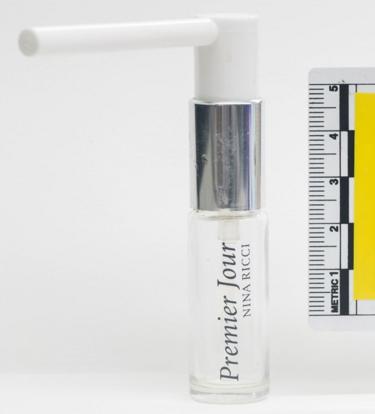 The small perfume bottle recovered from Mr Rowley's home
The small perfume bottle recovered from Mr Rowley's home"It now forms one investigation. We do not believe Dawn and Charlie were deliberately targeted, but became victims as a result of the recklessness in which such a toxic nerve agent was disposed of."
Prime Minister Theresa May is due to make a statement in the House of Commons to update MPs on the investigation.
BBC
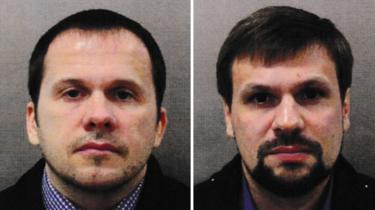 Alexander Petrov (left) and Ruslan Boshirov are not thought to be their real names
Alexander Petrov (left) and Ruslan Boshirov are not thought to be their real names

Comments